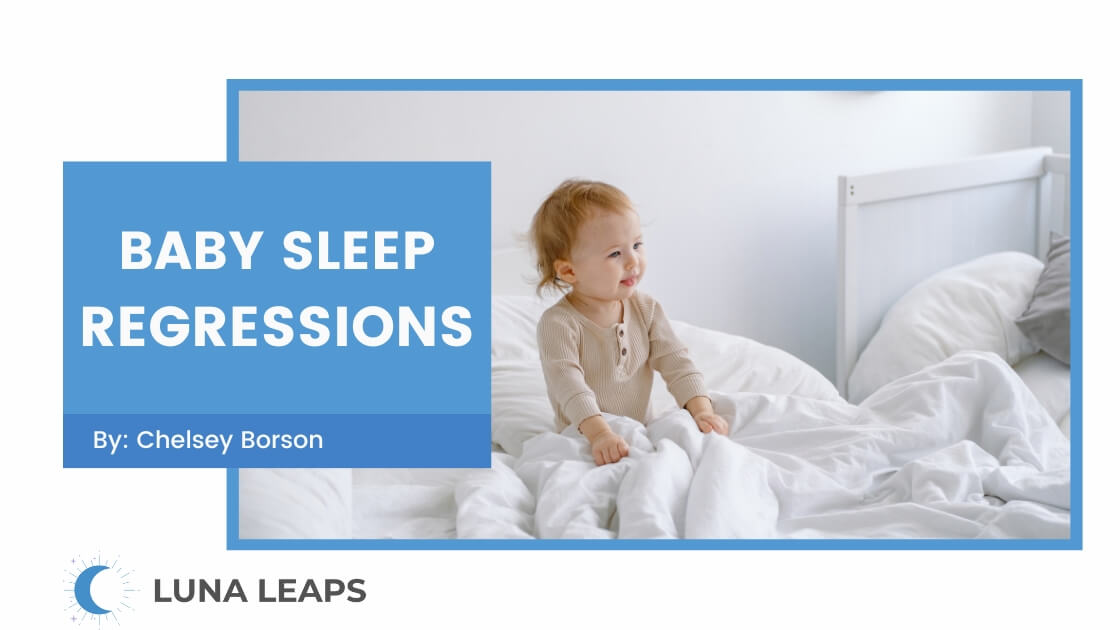Last Updated on November 1, 2023


Are you tired of your baby experiencing sleep problems like short naps and frequent night waking? If this has been your experience, then there's a good chance your child might be going through a baby sleep regression.
Sleep regressions are a common phenomenon that happens multiple times during a baby's life. The common sleep regression ages are 4 months old, 6 months old, 8-10 months, 12 months, 14-15 months, 18 months, and 2 years of age.
As the lead baby sleep coach at Luna Leaps, I'm here to take you through the ins and outs of sleep regressions, as well as what you can expect during these challenging times. If you're seeking personalized assistance, please don't hesitate to reach out to me. My goal is to provide unwavering support to families on their journey to achieving better sleep, whatever that may look like.
Sleep regressions refer to a period when a baby or toddler, who was previously a good sleeper or even just an OK sleeper, suddenly starts experiencing sleep issues and isn't sleeping well anymore.
Research indicates that oftentimes these sleep regressions happen due to developmental milestones, like learning how to crawl or talk for example. They can also happen for reasons like traveling, big life changes, teething, or illness. They usually involve a sudden change in a baby or toddler's sleep behavior, leading to increased fussiness, resistance at bedtime, or other various sleep troubles.
Sleep regression takes place during various stages and ages. While they can occur at any age, the most common ages for sleep regression to take place are 4 months old, 6 months old, 8-10 months old, 12 months old, 14-15 months old, 18 months old, and 2 years old.
At these ages, it's quite common for babies sleep to become disturbed, leading to waking up frequently at night or resisting naps. Most children will go through a temporary shift in their sleep patterns for a few weeks before returning to their usual routine.
The 4-month sleep regression usually marks a baby's first encounter with a sleep regression. During the 4-month sleep regression, their bedtime routine becomes disrupted, and they tend to become fussy. It's often considered one of the most challenging times for new parents.
Managing most sleep regressions can be tough and demands a great deal of patience. Fortunately, most sleep regressions tend to last for about 2-6 weeks and are temporary.
While a 6-month sleep regression is not as common as other regressions, it is still not unheard of. At this age, babies are quickly learning new motor skills and are starting to make sounds as well. This causes them to be interested in staying awake so that they can explore their new abilities, resulting in sleep regression.
Additionally, babies normally begin solids around this age; this big step could also significantly impact their sleep behaviors.
Around 8-10 months of age, you may notice another round of sleep regression in your baby. This regression coincides with various developmental milestones, such as the emergence of separation anxiety, which can disrupt your baby's sleep patterns. During this phase, your little one may resist napping and stay awake for longer stretches.
Also, this age range is a common time for a nap transition from three naps to two. As a result, your baby's sleep schedule may shift, leading to changes in their napping habits and nighttime sleep while they adjust.
As your child approaches 12 months, they often undergo growth spurts, which can trigger biological changes in their bodies. These changes can disrupt their previously established sleep patterns and lead to difficulties with sleep associations.
There are several factors that contribute to the 12-month sleep regression including increased separation anxiety, ongoing brain development, and the emergence of new skills (i.e. walking and talking).
Knowing what's going on can help make it easier for you to help your baby transition back into proper sleeping habits.
Surprisingly, sleep regressions don't always stop once your baby hits the one-year mark. While every baby's schedule is unique, it's quite common for toddlers to experience a sleep regression around 14 to 15 months of age.
Around this age, toddlers often switch to a one-nap schedule, causing a big disruption in the schedule. Toddlers also begin to push boundaries and test limits at this age, thanks to newfound independence.
At 18 months, toddlers are often going through a ton of new developmental milestones. This age marks another significant transition, with many children shifting to a single nap during the day, much like the 14-15-month sleep regression. 18-month sleep regression is extremely common.
Additionally, children of this age group tend to be more adventurous in experimenting with their independence, which may result in increased resistance to bedtime routines and their ability to fall asleep.
The primary behaviors seen during the 2-year sleep regression are nap resistance and bedtime stalling. Around this age, many children require more awake time to become adequately tired for sleep.
Consequently, toddlers may have difficulty settling for naps and bedtime if they are put down too early or have not been awake long enough. Additionally, their growing desire for independence and boundary-testing tendencies can turn bedtime into a massive struggle..
Sleep regression can manifest in various ways, so it's essential that you know the signs to be able to support your baby in the best ways possible.
The common signs of sleep regression include:
Increased night waking and awake time
Difficulty falling asleep
Shortened or skipped naps
Changes in appetite
Irritability
Changes in behavior
Teething and sleep regression are both common developmental steps that babies take during their early ages. Understanding the differences between both will help you identify the root cause of your child's behavior making it easier for you to handle.
Teething:
Teething often begins around 6 months of age, although the exact timing varies. Some infants may start teething as early as 3 months, while others might not begin until around 12 months.
To provide relief from teething discomfort, consider offering chilled teething toys, which can help soothe the pain and discomfort associated with the emergence of new teeth.
Sleep Regression:
Sleep regression occurs during different developmental stages and is typically temporary, lasting for about 4 to 6 weeks. This phase may result in changes to your child's sleep routine.
Common sleep regression signs include disruptions in nap patterns and nighttime sleep, accompanied by irritability and mood swings in your child.
A typical sleep regression tends to last around 2 to 6 weeks on average. However, it's important to keep in mind that this timeframe can vary from one child to another, as every child progresses through their stages of development differently.
While some toddlers may go through it for a shorter period, others may experience it for longer than 6 weeks. Nevertheless, as parents, it's important to create a secure and comforting environment to help them navigate this challenging phase with ease and comfort.
No, not all babies experience sleep regressions, and those who do may not follow the same timeline.
While sleep regressions are common among infants and toddlers, it's important to note that not every child will necessarily go through them, and even if they do, the timing and duration can vary from one child to another.
Recovering from a sleep regression is a crucial step in a baby's development. It takes time and patience, but there are several strategies to help you and your child go through this.
Here are some key steps to help your child during a sleep regression:
Establish a Consistent Routine: Stick to a regular bedtime and nap schedule to provide structure and help your child adjust to sleep changes.
Provide Comfort: Offer comfort to your child during nighttime wake-ups with soothing techniques like words of comfort or physical touch.
Create a Safe Sleep Environment: Ensure your child's sleeping area is safe, quiet, and comfortable to promote better sleep.
Monitor Sleeping Patterns: Keep track of your child's sleep patterns and any changes, which can provide insights into their sleep needs. Be mindful of sleeping cues or signs that your little one is ready for sleep.
These steps can help you better manage sleep regressions and promote your child's healthy sleep development. If you feel the need for additional guidance and support during this time, remember that Luna Leaps, a Los Angeles baby sleep consultant, is here to provide expert assistance and reassure you about your baby's sleep.
Contact me to find out how we can help your little one sleep better today!

Hi, I'm the founder of Luna Leaps. As a certified sleep consultant with the Institute of Pediatric Sleep and Parenting, I bring expertise and compassion to helping families establish healthy sleep habits. As a mom of two, including one with special needs, I understand the struggles of sleepless nights and the toll it can take on the whole family. But with a personalized plan tailored to your child's unique needs, we can work together to improve sleep and overall well-being. Let's start this journey towards better sleep together.